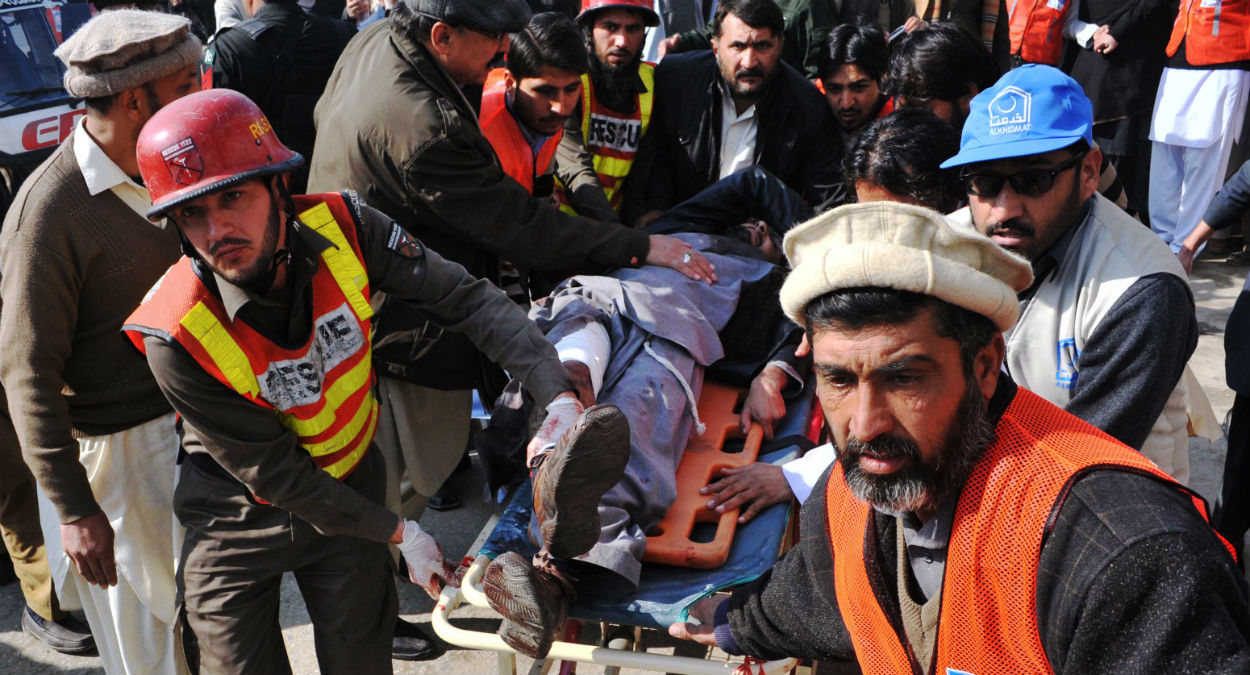Bacha Khan: at least 19 dead in attack on Pakistan university
Taliban denies responsibility after four men wearing suicide vests open fire on campus

A free daily email with the biggest news stories of the day – and the best features from TheWeek.com
You are now subscribed
Your newsletter sign-up was successful
At least 19 people have been killed and dozens wounded in a gun attack on a university in Pakistan.
Four armed men in suicide vests opened fire at the Bacha Khan University campus in Charsadda, in the north-west of the country.
Local media reports the attack appeared to have begun at a hostel for male students, although the victims include both men and women. The gunmen climbed over a wall to reach the building at around 9.30am local time (4.30am GMT), before firing indiscriminately on students and staff.
The Week
Escape your echo chamber. Get the facts behind the news, plus analysis from multiple perspectives.

Sign up for The Week's Free Newsletters
From our morning news briefing to a weekly Good News Newsletter, get the best of The Week delivered directly to your inbox.
From our morning news briefing to a weekly Good News Newsletter, get the best of The Week delivered directly to your inbox.
"They were directly shooting at the heads of the students," one student named Naseer told The Guardian.
Eyewitness reports suggest that grenades or suicide bombings may have also formed part of the attack.
Soldiers were rushed in from the provincial capital, Peshawar, to help police clear the campus while anxious relatives waited for news outside the gates. A spokesman for the army later tweeted that all four known gunmen had been killed by security forces.
There have been conflicting estimates of the number killed, ranging from 19 and 31 victims. However, this is likely to be revised to a far higher figure, with one witness telling The Guardian he counted 56 bodies.
A free daily email with the biggest news stories of the day – and the best features from TheWeek.com
Charsadda is located in the Khyber Pakhtunkhwa province, which has long been a centre of unrest and terrorist militancy. In 2014, an armed assault by Tehreek-e-Taliban Pakistan militants killed 141 people, mostly children, at a military school in Peshawar, which lies 30 miles from Bacha Khan University.
According to reports, the same group at first claimed responsibility for Wednesday's attack, but this was later denied by an official spokesman, who said the assault was "un-Islamic".
One faculty member told the BBC he suspected the attacks may have been connected to a planned poetry event honouring the university's namesake, Pashtun nationalist Bacha Khan. Khan's grandson leads the secular Awami National Party, which has opposed the Taliban since the 1980s.
-
 Local elections 2026: where are they and who is expected to win?
Local elections 2026: where are they and who is expected to win?The Explainer Labour is braced for heavy losses and U-turn on postponing some council elections hasn’t helped the party’s prospects
-
 6 of the world’s most accessible destinations
6 of the world’s most accessible destinationsThe Week Recommends Experience all of Berlin, Singapore and Sydney
-
 How the FCC’s ‘equal time’ rule works
How the FCC’s ‘equal time’ rule worksIn the Spotlight The law is at the heart of the Colbert-CBS conflict
-
 Epstein files topple law CEO, roil UK government
Epstein files topple law CEO, roil UK governmentSpeed Read Peter Mandelson, Britain’s former ambassador to the US, is caught up in the scandal
-
 Iran and US prepare to meet after skirmishes
Iran and US prepare to meet after skirmishesSpeed Read The incident comes amid heightened tensions in the Middle East
-
 Israel retrieves final hostage’s body from Gaza
Israel retrieves final hostage’s body from GazaSpeed Read The 24-year-old police officer was killed during the initial Hamas attack
-
 China’s Xi targets top general in growing purge
China’s Xi targets top general in growing purgeSpeed Read Zhang Youxia is being investigated over ‘grave violations’ of the law
-
 Panama and Canada are negotiating over a crucial copper mine
Panama and Canada are negotiating over a crucial copper mineIn the Spotlight Panama is set to make a final decision on the mine this summer
-
 Why Greenland’s natural resources are nearly impossible to mine
Why Greenland’s natural resources are nearly impossible to mineThe Explainer The country’s natural landscape makes the task extremely difficult
-
 Iran cuts internet as protests escalate
Iran cuts internet as protests escalateSpeed Reada Government buildings across the country have been set on fire
-
 US nabs ‘shadow’ tanker claimed by Russia
US nabs ‘shadow’ tanker claimed by RussiaSpeed Read The ship was one of two vessels seized by the US military